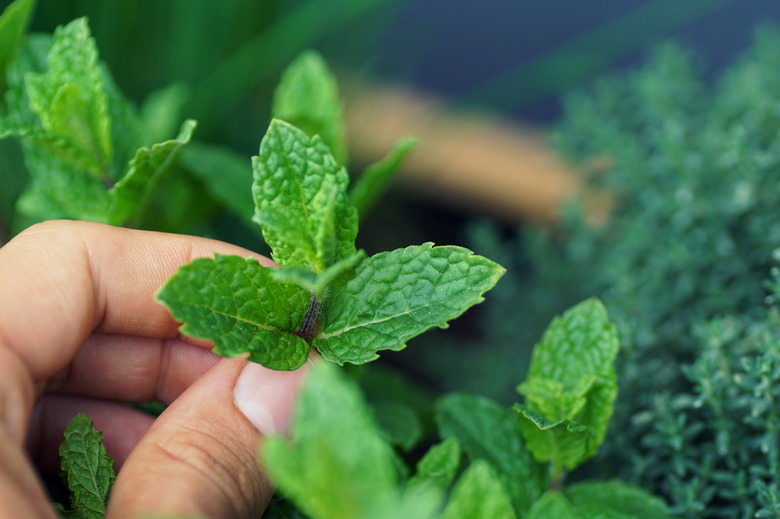Does Mint Repel Rats?
We may receive a commission on purchases made from links.
Whether it's roof rats or Norwegian rats, these rodents are something you do not want to have around your home and property. Voracious eaters, rats live in cities and on farms, will consume almost anything and can be the carriers of diseases. The varmints also damage ornamental and edible garden plants and can get into your car engine, where they like to chew up wires. The cunning critters can be difficult to eliminate, but with some natural controls, such as mint (Mentha spp.), you can help rid your home of these bothersome animals.
Tip
Essential peppermint oil can be used to repel rats.
Ward Off Rats Early
Ward Off Rats Early
Prevention is the best cure for rats. Most important, do not leave food around, either indoors or outside. This includes compost piles, which are a favorite place for rats to dine after nightfall. Keep compost piles covered at all times.
Keep all garbage cans securely closed and trees pruned away from your house and other buildings. Some types of rats climb up trees and then jump onto buildings. Seal all holes in buildings, screens and under doors. If you install door sweeps, they will prevent rats from entering your home or outbuildings.
Using Mint to Repel Rats
Using Mint to Repel Rats
Although mint is a pleasant aroma to most humans, rats shy away from it and other strong scents, such as ammonia and animal urine. Soak rags or cotton balls with a few drops of essential peppermint oil and place them in areas where you have seen or suspect rats.
Mint oil will wash away after a rain and needs to be reapplied often, such as every other day, to keep the scent strong enough to repel rats.
Growing Mint to Repel Rats
Growing Mint to Repel Rats
Don't expect a little mint oil or a few mint plants to completely rid your property of a large rat population. The planted mint alone won't deter the rats. The concentrated smell of mint in oil will help to keep them at bay.
If you decide to plant mint in the garden to repel rats and make your own spray, be aware that it can take quite a few plants to ward off rats. Peppermint (Mentha x piperita) grows as a perennial in U.S. Department of Agriculture plant hardiness zones 5 through 9, or it can be grown indoors.
Mint is a fast-growing plant and can overtake a vegetable garden so take care to plant it in pots or containers so that the roots can't spread.
Homemade Mint Spray
Homemade Mint Spray
A homemade mint spray can be useful in repelling mice and rats. To make your own spray, mix a cup of water with 2 teaspoons of peppermint oil. Rubbing alcohol can be used in place of water as well. Dip cotton balls in the solution and leave where you have seen rats congregate or skitter past.
You can add black pepper or cayenne to the mix to further repel rats. The cayenne will get on their skin or feet and irritate them when they lick it off.
Other Helpful Plants and Methods
Other Helpful Plants and Methods
Because dogs are natural predators of rats, their scent may scare these unwanted creatures away if you place dog hair or urine where rats congregate. If you soak a rag in ammonia and then place it in a coffee can near their home, rats will relocate in short order.
Your city might allow live trapping and release of rats; if so, this practice could be an option. Be sure to release any animals you catch far from populated areas. For severe infestations, look for an environmentally friendly exterminator. These companies are on the rise and specialize in pest control without the use of toxic substances.
